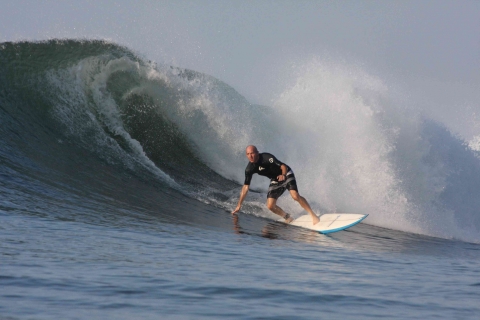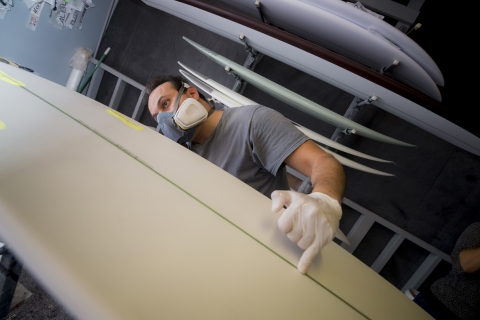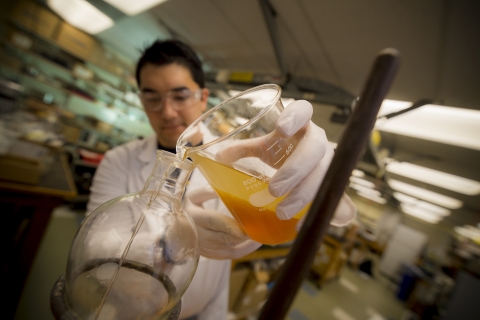On the eve of Earth Day, UCSD unveiled their new innovative and sustainable algae surfboard at the San Diego Symphony Hall. San Diego Mayor Kevin Faulconer, Marty Gilchrist of Arctic Foam, Steve Mayfield of Cal-CAB, and champion surfer Rob Machado discuss the development of the “surfboard of the future.” Credit: UC San Diego
Undergraduate students at UCSD determined how to chemically change the oil from laboratory algae into different kinds of “polyols” to produce the core of the algae surfboard. Credit: Erik Jepsen, UC San Diego
In Oceanside, California workers from Arctic Foam prepare the world’s first algae surfboard for the application of a fiberglass. Credit: Erik Jepsen, UC San Diego

Energy Department-funded scientists at the University of California San Diego (UCSD) California Center for Algae Biotechnology have successfully demonstrated a uniquely Californian solution to replacing fossil fuels—surfboards made from algae.
These sustainable “surfboards of the future” are made of algal oil, provided by Energy Department-funded and California-based biotech firm Solazyme. The oil is converted to polyols by UCSD chemists and then sent to the surfboard manufacturer Arctic Foam to shape the foam boards and then coat them with fiberglass and a renewable plant-based resin. Early surfer reviews have said the initial prototype was a “perfect ten.” The end-product is slightly more flexible than standard surfboards, which appeals to many seasoned surfers. Future work could make use of algae’s unique properties to create polyols that are specially tuned for foam characteristics that could further enhance surfboard performance.

Stephen Mayfield, Professor of Biology at UC San Diego (UCSD), rides a wave in El Salvador. He was a part of the UCSD team that developed the first algae-based surfboard. Credit: Stephen Mayfield, UC San Diego
Almost all surfboards, along with many other everyday products, are made from fossil fuel-derived polyurethane foam. Polyurethane is made of polyols which are chemical compounds commonly used to manufacture flexible or rigid foams, such as those used in vehicle interiors and building insulation. They can also be used in coatings, sealants, and adhesives to produce an incredibly diverse array of products. By creating polyols from algae, UCSD scientists have clearly demonstrated that algae-based products have the potential to displace fossil fuel-derived chemicals. It may also provide a revenue stream for start-up companies seeking to scale-up algae production to the quantities required to meet the Energy Department’s 2030 goal of $3 per gallon gasoline equivalent algal biofuel.

In Oceanside, California workers from Arctic Foam prepare the world’s first algae
surfboard for the application of a fiberglass. Credit: Erik Jepsen, UC San Diego
On the eve of Earth Day, UCSD officially presented the first surfboard, bearing an Energy Department logo, to San Diego Mayor Kevin Faulconer at the premiere of National Geographic’s “World’s Smart Cities: San Diego” documentary, scheduled to air later this month on the National Geographic Channel. UCSD also plans to submit an entry at a San Diego surfboard convention for a sustainable surfboard innovations prize. For more details about the ceremony and information on the development of the algae-based surfboard, check out the UCSD article, Surfing into a Greener Future.

Undergraduate students at UCSD determined how to chemically change the oil from laboratory algae into different kinds of “polyols” to produce the core of the algae surfboard. Credit: Erik Jepsen, UC San Diego
Twelve percent of each barrel of crude oil in the United States is used to make petrochemicals such as polyurethane and other non-fuel products. Displacing these products with algae -derived alternatives will reduce greenhouse gas emissions, help to foster the domestic bioeconomy, and provide sustainable alternatives to environmentally conscious consumers. Half a million polyurethane surfboard cores are produced each year, and each could be produced from just a half liter of algal oil. This Energy Department-funded demonstration is one of many early stepping stones on the path towards full commercialization of algal biofuels. Learn more about the Energy Department’s research in renewable bioenergy technologies and market-based solutions here.


